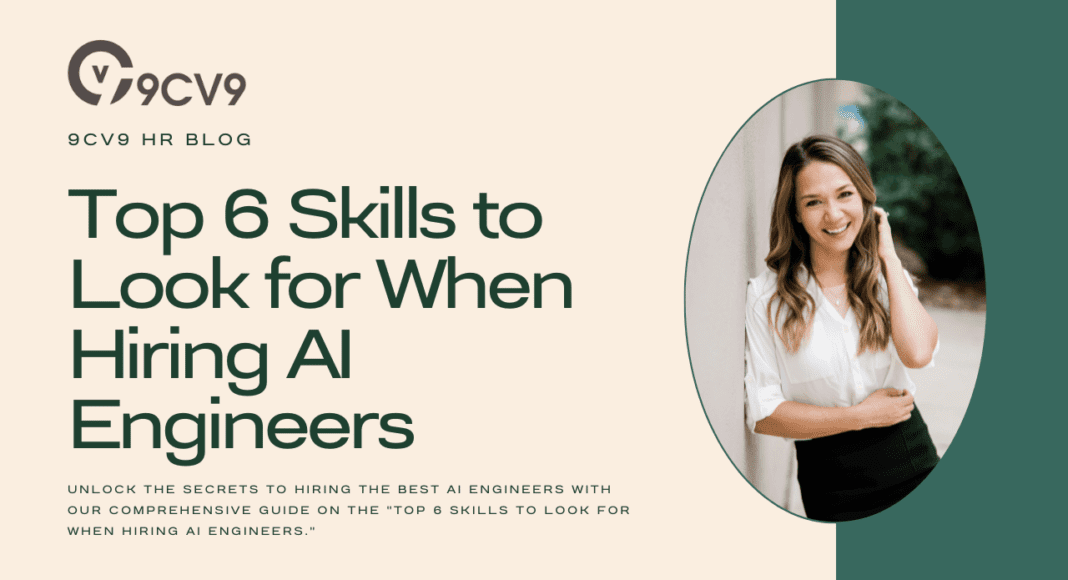Key Takeaways
- Discover the Top 6 Skills essential for hiring AI Engineers and propel your organization toward AI-driven success.
- Technical expertise, problem-solving brilliance, and adaptable minds are key attributes of exceptional AI Engineers.
- Embrace the magic of collaboration and soft skills when assembling your dream team of AI virtuosos.
In the pulsating heart of the digital revolution, where innovation transcends boundaries and technology orchestrates the symphony of progress, Artificial Intelligence (AI) stands as the enigmatic conductor, leading the charge towards a future brimming with untold possibilities.
The realm of AI is a captivating fusion of science, art, and magic, where engineers are the virtuosos wielding the baton of intelligence to craft solutions that push the limits of human potential.
As businesses across industries scramble to harness the transformative power of AI, the pursuit of hiring exceptional AI engineers becomes nothing short of an epic odyssey.
These modern-day wizards possess the alchemical concoction of technical prowess, creative ingenuity, and problem-solving wizardry.
With their fingers on the pulse of cutting-edge technology, they orchestrate AI-driven symphonies that resonate through the digital landscape, harmonizing complex data into insightful melodies.
In this quest for unearthing the brightest AI minds, every hiring manager plays the role of an astute talent scout, meticulously scouting for the top 6 skills that set apart the legendary AI engineers from the rest.
In this blog, we embark on a thrilling expedition to uncover those elusive qualities that ignite the spark of brilliance in AI engineers, propelling them to the zenith of their craft.
So, buckle up for an exhilarating journey into the mystical domain of AI, where we’ll unravel the five most coveted skills that glisten like stardust in the resumes of exceptional AI engineers.
From technical prowess that delves into the depths of machine learning algorithms to the dazzling artistry of problem-solving and analytical thinking, we’ll traverse the landscapes of mathematics, statistics, and domain knowledge to unearth the hidden gems in the realm of AI engineering.
But the quest doesn’t end with mere technical acumen; we’ll venture into the uncharted territories of adaptability and continuous learning, where the winds of change blow through the ever-evolving AI ecosystem.
Embracing the spirit of innovation and pushing the boundaries of what’s possible, AI engineers who possess these transformative traits emerge as trailblazers shaping the course of the AI frontier.
Yet, there is another dimension to this saga that breathes life into the AI ecosystem—the symphony of collaboration.
In this era of interconnectedness, where teams coalesce into forces of extraordinary synergy, the soft skills and team collaboration abilities of AI engineers become the foundation upon which monumental achievements are built.
So, fellow travelers, gather your curiosity and join us on this extraordinary odyssey to unravel the enigma of AI engineering.
As we set sail into the vast ocean of knowledge, prepare to be enlightened, inspired, and amazed by the awe-inspiring skills that epitomize the essence of AI excellence.
With each turn of the page, we’ll demystify the secrets of AI engineers, delving deep into their minds, decoding the matrix of their talents, and illuminating the path for hiring managers to discover the perfect blend of skills that fuel the AI revolution.
Let’s dive headfirst into the realm of AI engineering, where innovation knows no bounds, and creativity intertwines with science to craft a symphony that echoes across generations.
Together, we’ll unlock the door to the future, where AI engineers stand as the vanguard, charting the course towards a world of infinite possibilities.
So, fasten your seatbelts and embark on this mesmerizing expedition to find the Top 6 Skills to Look for When Hiring AI Engineers.
Before we venture further into this article, we like to share who we are and what we do.
About 9cv9
9cv9 is a business tech startup based in Singapore and Asia, with a strong presence all over the world.
With over six years of startup and business experience, and being highly involved in connecting with thousands of companies and startups, the 9cv9 team has listed some important learning points in this overview of the guide on the Top 6 Skills to Look for When Hiring AI Engineers.
If your company needs recruitment and headhunting services to hire top-quality AI engineering employees, you can use 9cv9 headhunting and recruitment services to hire top talents and candidates. Find out more here, or send over an email to [email protected].
Or just post 1 free job posting here at 9cv9 Hiring Portal in under 10 minutes.
Top 6 Skills to Look for When Hiring AI Engineers
- Technical Expertise and Programming Proficiency
- Problem-Solving and Analytical Skills
- Mathematics and Statistics Acumen
- Domain Knowledge and Industry Experience
- Adaptability and Continuous Learning
- Soft Skills and Team Collaboration
1. Technical Expertise and Programming Proficiency

In the exhilarating world of AI engineering, technical expertise and programming proficiency serve as the backbone of groundbreaking innovations.
As AI engineers navigate the labyrinth of algorithms, data structures, and frameworks, their mastery in these domains becomes the driving force behind transformative solutions that shape industries and revolutionize businesses.
In-depth Understanding of Machine Learning Algorithms
The prowess of an AI engineer lies in their profound knowledge and practical application of machine learning algorithms.
From classic algorithms like linear regression and decision trees to advanced ones like convolutional neural networks (CNNs) and recurrent neural networks (RNNs), a comprehensive understanding of these models allows engineers to design predictive and prescriptive solutions that cater to a myriad of business challenges.
Example: Imagine a healthcare institution aiming to improve patient care by predicting disease progression. An AI engineer with expertise in machine learning algorithms can leverage sequential models like RNNs to analyze historical patient data, predict potential complications, and recommend personalized treatment plans.
Proficiency in Programming Languages
Programming languages act as the tools through which AI engineers craft their magical algorithms and models.
Proficiency in popular languages such as Python, R, and Java empowers engineers to transform raw data into actionable insights, paving the way for dynamic AI-driven applications.
Data: Python remains the most popular programming language globally, with a market share of over 30%. Its versatility and ease of use make it a top choice for AI engineers in various industries.
Knowledge of Data Structures and Algorithms
Data structures and algorithms lay the groundwork for efficient data processing and manipulation.
An AI engineer skilled in organizing and optimizing data structures like arrays, linked lists, and hash tables, combined with algorithmic problem-solving expertise, can design AI models that deliver high performance and scalability.
Example: An e-commerce giant seeking to enhance its recommendation engine can benefit from AI engineers who leverage advanced data structures and algorithms to efficiently process vast amounts of customer data and provide real-time personalized product recommendations.
Familiarity with Deep Learning Frameworks
Deep learning, a subset of machine learning, empowers AI engineers to unravel complex patterns from unstructured data.
Proficiency in deep learning frameworks like TensorFlow and PyTorch enables engineers to construct deep neural networks, enabling them to conquer challenges in computer vision, natural language processing, and more.
According to a report, TensorFlow and PyTorch are the two most widely used deep learning frameworks among data scientists and AI engineers, with TensorFlow having a slight edge in popularity.
Example: An autonomous vehicle manufacturer aiming to enhance its perception system can rely on AI engineers proficient in deep learning frameworks to build sophisticated convolutional neural networks that identify and interpret traffic signs, pedestrians, and other objects on the road.
Technical expertise and programming proficiency are the bedrock of AI engineering.
An AI engineer’s proficiency in machine learning algorithms, programming languages, data structures, and deep learning frameworks empowers them to wield AI’s transformative potential to tackle diverse challenges across industries.
2. Problem-Solving and Analytical Skills

In the realm of AI engineering, problem-solving and analytical skills are the enchanted keys that unlock the doors to innovation.
AI engineers, akin to modern-day alchemists, possess the ability to unravel intricate challenges, decipher patterns within data, and transmute raw information into actionable insights that propel businesses to new heights.
These skills form the crux of an AI engineer’s repertoire, enabling them to weave their magic and create solutions that redefine the possibilities of technology.
Ability to Identify and Define AI-Related Challenges
A proficient AI engineer possesses a keen eye for identifying the pain points and opportunities where AI can make a tangible impact.
By working closely with stakeholders and domain experts, they discern the most pressing problems that AI can address, thus steering the development of AI projects towards the path of success.
Example: In the realm of finance, an AI engineer collaborates with a banking institution to identify the challenge of detecting fraudulent transactions amidst a vast sea of legitimate ones. Through careful analysis and problem definition, the engineer tailors an anomaly detection algorithm that safeguards the institution from potential financial losses.
Analytical Thinking to Develop Effective Solutions
Analytical thinking forms the core of an AI engineer’s approach to problem-solving.
By breaking down complex challenges into manageable components, they analyze data patterns, conduct experiments, and iterate on models, ultimately producing robust solutions that stand the test of time.
According to a survey, 72% of organizations consider analytical thinking and innovation as crucial skills for their AI engineering teams.
Demonstrated Experience in Troubleshooting AI Models
In the unpredictable realm of AI, troubleshooting is an indispensable skill. AI engineers adept at detecting and resolving issues in AI models ensure the reliability and accuracy of the deployed solutions, minimizing potential risks and ensuring consistent performance.
Example: A tech startup specializing in natural language processing faces challenges with its chatbot’s accuracy. A skilled AI engineer investigates the model’s weaknesses, refines its training data, and fine-tunes the architecture, resulting in a chatbot that delivers highly accurate and contextually relevant responses.
Data-Driven Decision-Making Skills
In an AI-driven world, data is the lifeblood that nourishes intelligent systems.
AI engineers with data-driven decision-making skills leverage insights obtained from data analysis to make informed choices about model selection, hyperparameter tuning, and optimization, ultimately yielding optimal AI solutions.
According to a survey, organizations that embrace data-driven decision-making are 23 times more likely to outperform their competitors financially.
Example: An e-commerce giant seeks to optimize its product recommendations for individual users. AI engineers, armed with data-driven decision-making skills, analyze customer behavior data to implement a personalized recommendation system, resulting in increased customer engagement and sales.
Problem-solving and analytical skills are the enchanted wands that empower AI engineers to weave their magic.
Their ability to identify challenges, apply analytical thinking, troubleshoot models, and make data-driven decisions determines the success of AI projects.
Armed with these skills, AI engineers stand as formidable problem solvers, creating transformative solutions that reshape industries and drive progress.
3. Mathematics and Statistics Acumen

In the enchanting realm of AI engineering, the mastery of mathematics and statistics forms the cornerstone of spellbinding creations that unravel the mysteries hidden within data.
AI engineers, akin to mathematical virtuosos, wield the power of calculus, linear algebra, and probability theory to transform raw information into actionable insights, illuminating the path to intelligent decision-making and innovation.
With a profound understanding of these disciplines, AI engineers transcend the boundaries of what’s possible, orchestrating symphonies of data-driven brilliance that shape the future of technology.
Strong Grasp of Linear Algebra and Calculus Concepts
Linear algebra and calculus are the potent ingredients that fuel the magic of AI engineering.
Adept AI engineers harness linear algebra to manipulate data matrices, performing operations like matrix multiplication and eigenvalue decomposition, which underpin essential algorithms like principal component analysis (PCA) and singular value decomposition (SVD).
Example: An AI engineer revolutionizes image recognition by utilizing linear algebra to create a facial recognition algorithm based on eigenfaces, enabling the system to identify individuals accurately, even in diverse lighting conditions.
Understanding of Probability Theory and Statistics
Probability theory and statistics bestow the power of inference upon AI engineers.
Armed with statistical methods like hypothesis testing, regression analysis, and Bayesian inference, they derive meaningful insights from data distributions, enabling data-driven decisions and predictive modeling.
A survey indicates that statistical analysis, including probability and hypothesis testing, is employed by data scientists and AI engineers in their projects.
Example: An AI engineer collaborates with a retail giant to predict customer churn. Applying statistical techniques to customer data, the engineer builds a churn prediction model that empowers the company to implement targeted retention strategies and reduce customer attrition.
Application of Mathematical Concepts in AI Model Development
The integration of mathematical concepts into AI model development is the hallmark of a skillful AI engineer.
By fusing domain-specific knowledge with mathematical principles, engineers craft models tailored to the unique challenges presented by diverse industries and use cases.
Example: In the healthcare domain, an AI engineer combines medical expertise with mathematical modeling to design a personalized medicine algorithm that analyzes patient genetic data to prescribe precise treatments, enhancing patient outcomes and minimizing side effects.
Leveraging Optimization Techniques in AI Applications
Optimization lies at the heart of AI engineering, with AI engineers employing techniques like gradient descent, genetic algorithms, and simulated annealing to fine-tune models and maximize performance.
According to a report, the market for AI as a Service is projected to grow from USD 9.3 billion in 2023 to USD 55.0 billion by 2028, at a CAGR of 42.6% during the forecast period, emphasizing the growing importance of optimization techniques in AI applications.
Example: An AI engineer collaborates with a logistics company to optimize delivery routes. Implementing genetic algorithms, the engineer devises an efficient route optimization system that significantly reduces transportation costs and delivery times.
Mathematics and statistics acumen form the magical enchantments that empower AI engineers to transform raw data into golden insights. Armed with a profound understanding of linear algebra, calculus, probability theory, and statistics, AI engineers embark on a journey of data-driven discovery, crafting AI solutions that propel industries forward and unravel the infinite possibilities of the digital age.
4. Domain Knowledge and Industry Experience

In the realm of AI engineering, domain knowledge and industry experience serve as the compass that guides engineers through the uncharted territories of real-world challenges.
AI engineers, akin to seasoned navigators, possess a deep understanding of specific industries, enabling them to weave AI solutions that harmonize with the unique intricacies and demands of each sector.
With their unparalleled expertise, they chart the course towards AI-driven innovation, steering businesses towards new horizons of growth and transformation.
Relevance of Industry-Specific Expertise for AI Projects
Domain knowledge is the lodestar that AI engineers follow when embarking on AI projects tailored to specific industries.
Engineers who possess a profound comprehension of healthcare, finance, manufacturing, or any other field, are better equipped to recognize opportunities, anticipate obstacles, and develop AI solutions aligned with industry needs.
Example: In the energy sector, an AI engineer with deep domain knowledge collaborates with a renewable energy company to optimize wind farm efficiency. Their understanding of wind patterns, energy generation, and grid integration leads to the development of a predictive maintenance model, reducing downtime and maximizing energy output.
Understanding Business Objectives and Translating Them to AI Solutions
AI engineers with industry experience excel at translating business objectives into AI-driven strategies. By immersing themselves in the intricacies of an organization’s goals and processes, they craft AI models that generate actionable insights, drive efficiency, and foster innovation.
Example: An e-commerce giant aims to enhance customer experience through personalized recommendations. An AI engineer with retail industry experience designs a recommendation engine that factors in customer behavior, historical purchases, and seasonal trends, resulting in a substantial increase in customer engagement and conversion rates.
Previous Experience in Similar AI Applications
Industry-specific experience equips AI engineers with the knowledge gleaned from previous AI applications in the same field. Leveraging lessons learned from past projects, engineers optimize AI models, avoid pitfalls, and accelerate the development of cutting-edge solutions.
Example: A healthcare institution endeavors to detect early signs of diseases through medical imaging. An AI engineer with prior experience in medical imaging AI applications fine-tunes the convolutional neural network (CNN) architecture, achieving higher accuracy in identifying anomalies.
The Power of Cross-Industry Insights
AI engineers with exposure to diverse industries possess a treasure trove of cross-industry insights.
Their ability to draw parallels and transfer knowledge from one sector to another fuels innovation, introducing fresh perspectives and groundbreaking solutions.
A study reveals that companies that draw insights from multiple industries are more likely to be among the top quartile of financial performers.
Example: An AI engineer with experience in both financial services and healthcare recognizes the potential for fraud detection in medical insurance claims. Applying methodologies from the financial sector, they develop an AI model that identifies suspicious claims, preventing fraudulent activities and safeguarding the healthcare system’s integrity.
Domain knowledge and industry experience empower AI engineers to steer the course of AI projects towards success.
Armed with insights into specific industries, these experts translate business objectives into AI solutions, leveraging cross-industry insights to fuel innovation and create transformative impact.
With their hands on the helm of AI-driven transformation, AI engineers with domain expertise set sail on a voyage of growth, propelling industries into a new era of intelligent progress.
5. Adaptability and Continuous Learning

In the ever-evolving landscape of AI engineering, adaptability and continuous learning are the enchanted wings that empower engineers to soar amidst the winds of change.
Like agile chameleons, AI engineers possess the remarkable ability to embrace emerging technologies, paradigms, and methodologies, ensuring they remain at the forefront of innovation.
Their thirst for knowledge knows no bounds, as they partake in a perpetual quest for learning, refining their craft, and shaping the future of AI with each new discovery.
Willingness to Embrace Emerging AI Technologies
The rapid pace of technological advancement in AI demands engineers who eagerly embrace new tools and frameworks. By staying attuned to emerging AI technologies, engineers leverage the latest advancements to create cutting-edge solutions, amplifying the potential for breakthrough innovations.
Example: A tech startup, seeking to build an AI-powered chatbot, enlists engineers with a proclivity for adopting emerging technologies. These engineers employ OpenAI’s GPT-3, the latest language model, to develop a chatbot with human-like conversation capabilities, offering a revolutionary user experience.
Ability to Learn and Adapt to Rapidly Evolving AI Trends
AI engineers’ capacity to adapt to rapidly evolving trends is a defining trait that sets them apart. They proactively acquire knowledge about the latest AI trends, research papers, and best practices, enabling them to apply cutting-edge methodologies to solve intricate problems.
Example: An AI engineer, in response to the surge in natural language processing applications, dedicates time to study the Transformer architecture, resulting in the creation of a state-of-the-art language translation model that outperforms traditional approaches.
Participation in AI Communities and Continuous Education
AI engineers thrive within vibrant communities of like-minded individuals, exchanging insights, and collaborating on projects.
Their engagement in AI communities grants them access to diverse perspectives and novel ideas, fostering an environment of collaborative growth.
Example: An AI engineer actively contributes to open-source AI projects and engages in hackathons organized by AI communities. Their collaborative efforts lead to the development of an AI-powered healthcare solution that diagnoses diseases accurately and efficiently.
Navigating Ethical and Regulatory Challenges
The AI landscape is accompanied by ethical and regulatory complexities.
Agile AI engineers possess the adaptability to navigate these challenges, ensuring their solutions align with ethical guidelines and adhere to data privacy regulations.
Example: A financial institution leverages AI for credit risk assessment. AI engineers continuously monitor and update the model to address bias, ensuring fair lending practices and compliance with financial regulations.
Adaptability and continuous learning are the wings that enable AI engineers to soar amidst the ever-changing AI landscape.
With a willingness to embrace emerging technologies, an ability to adapt to trends, participation in AI communities, and a commitment to ethical and regulatory compliance, these engineers embark on an unending journey of growth and discovery.
By embracing the magic of adaptability and learning, AI engineers steer the course of innovation, propelling the world towards a future shaped by the transformative power of AI.
6. Soft Skills and Team Collaboration

In the dynamic realm of AI engineering, soft skills and team collaboration are the enchanting threads that weave the tapestry of success.
AI engineers, like magicians of synergy, recognize that their technical prowess must harmonize with effective communication, teamwork, and interpersonal abilities.
Thriving within collaborative ecosystems, they conjure AI solutions that transcend individual brilliance, fostering an alchemy that propels teams towards extraordinary accomplishments.
Effective Communication and Collaboration Abilities
AI engineers wield the power of effective communication to bridge the gap between technical complexities and business stakeholders.
Their ability to articulate AI concepts in a clear and concise manner fosters collaboration, ensuring a shared vision and understanding of project goals.
Example: An AI engineer collaborates with marketing professionals to implement an AI-driven recommendation engine. Their effective communication skills enable seamless knowledge transfer, resulting in the alignment of marketing strategies with the capabilities of the AI system.
Team-Oriented Approach to Problem-Solving
AI engineers embrace a team-oriented mindset, understanding that collaborative problem-solving yields innovative solutions. By valuing diverse perspectives and fostering a culture of collective intelligence, they elevate teams to new heights of creativity and ingenuity.
A study reveals that teams that embrace a diverse, inclusive, and collaborative culture are more likely to achieve higher financial performance.
Example: A tech company endeavors to develop an AI-powered virtual assistant. AI engineers, with a team-oriented approach, collaborate with UX designers and customer support teams to create an assistant that seamlessly integrates user feedback and preferences.
Interdisciplinary Skills to Work with Cross-Functional Teams
AI engineers possess the magical ability to work harmoniously with cross-functional teams, blending their technical acumen with the expertise of professionals from diverse backgrounds. By embracing interdisciplinary skills, they forge bonds that enrich AI projects with multifaceted perspectives.
Example: An AI engineer collaborates with data scientists, healthcare professionals, and UX designers to create an AI-driven telemedicine platform. Their interdisciplinary skills enable the fusion of medical knowledge, data analysis, and user-centered design, leading to a user-friendly and accurate platform.
Emotional Intelligence and Empathy in Team Dynamics
Soft skills like emotional intelligence and empathy form the bedrock of positive team dynamics.
AI engineers, with their emotional acumen, foster a supportive and inclusive environment, promoting psychological safety and boosting team morale.
According to a study by Google’s Project Aristotle, teams with higher levels of psychological safety are more likely to be innovative and achieve exceptional results.
Example: An AI engineer, possessing emotional intelligence, recognizes the team’s stress during a high-pressure project phase. By addressing concerns and offering support, the engineer fosters resilience and enhances team performance.
Soft skills and team collaboration form the magical elixir that empowers AI engineers to flourish within collaborative ecosystems.
Their effective communication, team-oriented mindset, interdisciplinary skills, and emotional intelligence kindle the alchemy of collective brilliance.
By embracing the art of collaboration, AI engineers weave together the threads of success, orchestrating feats that transform industries and redefine the possibilities of AI-driven innovation.
Conclusion
In the captivating quest for hiring exceptional AI engineers, we have embarked on a journey to uncover the mystical qualities that set these modern-day magicians apart.
As we conclude our exploration of the “Top 6 Skills to Look for When Hiring AI Engineers,” the tapestry of talent weaved by these masterminds reveals a mesmerizing blend of technical brilliance, problem-solving ingenuity, and enchanting soft skills that form the backbone of AI-driven success.
From the ethereal realm of technical expertise and programming proficiency, where AI engineers wield the alchemical concoction of machine learning algorithms and deep learning frameworks, to the enchanting domain of mathematics and statistics acumen, where linear algebra and probability theory shape the very essence of data-driven insights—these skills illuminate the path to AI excellence.
The symphony of problem-solving and analytical skills harmonizes with the dance of adaptability and continuous learning, as AI engineers adeptly navigate the evolving tides of technology, never ceasing to pursue knowledge and refine their craft.
Yet, the enchantment does not end there, for AI engineers cast a spell of domain knowledge and industry experience, weaving their knowledge of specific sectors into AI solutions that resonate with the unique challenges of each industry.
Their transformative abilities translate business objectives into AI-driven strategies, bringing forth solutions that elevate industries and push the boundaries of what’s possible.
And as the grand finale, soft skills and team collaboration add the magical touch that elevates AI engineers beyond technical brilliance, for it is in the symphony of effective communication, teamwork, and emotional intelligence that their true alchemy emerges.
These enchanters thrive within collaborative ecosystems, embracing diverse perspectives, and fostering a culture of collective brilliance, empowering teams to achieve the extraordinary.
In the grand theater of AI engineering, where innovation takes center stage, the skills we have unraveled through this odyssey stand as the key to unlocking the full potential of AI-driven transformation.
By seeking AI engineers who possess this enchanting blend of skills, businesses can script their own tales of success, where AI solutions revolutionize industries, nurture innovation, and illuminate the path to a future of infinite possibilities.
As we bid adieu to this mystical voyage, let us remember that the quest for hiring top AI engineers is an enchanting endeavor—a quest where knowledge meets creativity, and innovation intertwines with collaboration.
So, fellow seekers of AI talent, may the wisdom and insights gained from this exploration guide your path to finding the exceptional AI engineers who will propel your organization towards a future of unparalleled achievements.
In the magical world of AI engineering, the journey never truly ends.
With each new challenge, with every unfolding technology, AI engineers will continue to weave the threads of brilliance, shaping the very fabric of progress.
Embrace the magic of AI, and let the alchemy of these top 6 skills elevate your organization to unprecedented heights.
The adventure awaits, and the possibilities are boundless. Step into the realm of AI brilliance, and let the enchantment begin.
If your company needs HR, hiring, or corporate services, you can use 9cv9 hiring and recruitment services. Book a consultation slot here, or send over an email to [email protected].
If you find this article useful, why not share it with your hiring manager and C-level suite friends and also leave a nice comment below?
We, at the 9cv9 Research Team, strive to bring the latest and most meaningful data, guides, and statistics to your doorstep.
To get access to top-quality guides, click over to 9cv9 Blog.
People Also Ask
What skills are required for an AI engineer?
AI engineers require technical expertise in machine learning algorithms, programming languages (Python, R), and data structures. They need strong math and statistics acumen, problem-solving skills, adaptability, and effective team collaboration. Continuous learning is vital in the ever-evolving AI landscape.
What makes a good AI engineer?
A good AI engineer possesses technical proficiency in ML, programming (Python, etc.), and data manipulation. They excel in problem-solving, adaptability, and effective communication. Continuous learning and industry knowledge drive their success in the dynamic world of AI.
What do I need to know to get a job in AI?
To get a job in AI, you need a strong foundation in programming (Python, etc.), math, and statistics. Familiarize yourself with machine learning concepts, deep learning frameworks, and data manipulation. Showcase projects, participate in AI communities, and stay updated with industry trends.































![Writing A Good CV [6 Tips To Improve Your CV] 6 Tips To Improve Your CV](https://blog.9cv9.com/wp-content/uploads/2020/06/2020-06-02-2-100x70.png)


